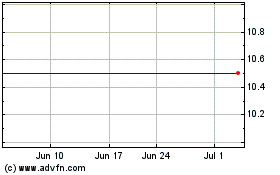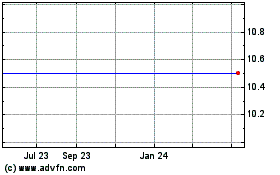Report Blames Wall Street, Banks For Payday Loan Growth
September 14 2010 - 4:04PM
Dow Jones News
The weak economic recovery might be making it harder for small
businesses and families to get loans. But there's at least one
unlikely group that's not having problems securing financing:
payday lenders.
That's the conclusion of a new study backed by a community group
that blames the nation's largest banks for the growth of the payday
loan industry.
Thanks to billions of dollars worth of financing from giant
banks, the payday loan industry is booming and poised for
expansion--even as consumer groups and government officials aim to
rein in the high-cost loan products, says the study.
The report was issued Tuesday by community group National
People's Action and watchdog group Public Accountability
Initiative.
"While small businesses and individuals have struggled to get
affordable loans in the wake of the taxpayer bailouts, payday
lenders have received new and amended credit agreements from Wall
Street," says the report. "Instead of wading further into the
business of predatory payday lending, big banks need to stop
financing these lenders and instead lend to businesses and
individuals that create wealth, rather than destroy it."
The study notes that payday loan companies depend heavily on
credit agreements and other financing vehicles from banks such as
Wells Fargo & Co. (WFC) and Bank of America Corp. (BAC). It
singles out Wells Fargo, in particular, saying the San
Francisco-based bank finances more payday lenders than any other
big bank, providing credit to lenders such as Advance America Cash
Advance Centers Inc. (AEA) and fueling the growth of the
industry.
A Wells Fargo spokesman told Dow Jones on Tuesday that while the
company is very selective, it doesn't impose barriers when it comes
to considering new credit customers. He added, though, that Wells
Fargo puts payday lenders and check-cashing companies through
higher levels of scrutiny before providing financing.
"Every responsible business that complies with the law has equal
access to consideration for credit," said Wells Fargo spokesman
Gabriel Boehmer. "That said, we exercise strict due diligence with
these customers to ensure they, like us, do business in a
responsible way."
Meanwhile, the study finds that banks are starting to offer
high-cost loans on their own, which suggests that the payday loan
business is ripe for growth, says the report. It adds that new
"checking advance" short-term loans being offered by banks can
carry extremely high interest rates of up to 120%.
The report, dubbed "The Predator's Creditors," seems to be a way
to shame banks into thinking twice about their ties to the payday
loan industry. It includes diagrams illustrating ties between Wall
Street executives and payday lenders and a table that lists
recipients of Troubled Asset Relief Program cash that have provided
financing to payday lenders.
"Ultimately, the big banks that borrow at near-zero interest
rates from the Federal Reserve are not far removed from the payday
companies that lend money at 500%," the report says.
Consumer groups have routinely attacked payday loans--the
high-cost, quick loans repaid from a borrower's paycheck--as debt
traps that simply hurt lower-income Americans by hitting them with
hefty fees and extra charges. And the Obama administration recently
unveiled a new initiative aimed at helping taxpayers avoid turning
to high-cost payday and tax-refund loans.
Still, Steven Schlein, a spokesman for payday lenders group
Community Financial Services Association, slammed the report for
painting "a misleading and distorted" picture of the relationship
between banks and payday lenders.
"Payday loans companies are in fact good creditors because their
customers are good creditors," he said, adding that 95% of payday
loans are repaid. "Payday loans are a valuable service to millions
of American consumers that have short-term financial needs."
Although Schlein says payday lenders are "highly regulated," the
report says new laws are needed. It recommends that lawmakers
institute a national cap on payday loan interest rates in wake of
failed congressional efforts earlier this year.
Still, the report says a cap will be tough to institute. "The
payday industry's political clout has allowed it to fight common
sense reforms that would have curtailed their ability to operate,"
it said.
-By Maya Jackson Randall, Dow Jones Newswires; 202-257-6313;
maya.jackson-randall@dowjones.com
Advance America (NYSE:AEA)
Historical Stock Chart
From Mar 2024 to Apr 2024

Advance America (NYSE:AEA)
Historical Stock Chart
From Apr 2023 to Apr 2024
